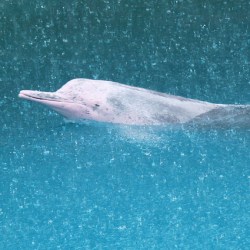Campaigners Urge Mexico To Extend Ban On Gillnets To Save Rare Porpoise From Extinction

The world’s most endangered marine species, is desperate need of an immediate extension of a fishing ban if it is to be saved. According to campaigners, there are less than 30 vaquita porpoises left, with their population having plunged by as much as 90% since 2011. The porpoises are often accidental victims of gillnets which has resulted in a ban on their usage for two years back in 2015. Campaigners are pinning their hopes on the fact that the Mexican government will extend the ban which expired at the end of May.
Can only be found in the Gulf of Mexico
The vaquita marine species can only be found in the Gulf of California which is a world heritage site that sits right in between the Baja peninsula and the Mexican mainland. The waters serve as home to a wide variety of species; however, the problem is that they also support half of all of Mexico’s fish production. Gillnets are a type of a net which are vertically hung so that the fish are caught by their gills. These nets were widely used in the Gulf prior to their ban in order to aid the vaquitas.
The ban has failed
The attempt has largely failed as fisherman continue to ply their trade on the waters as they seek to catch a Totoba a large species that is especially prized for its bladder. The bladders can fetch anywhere up to US$8,500 per kilogram on the black market because they are highly prized in Chinese medicine. As result of the hunt, the vaquitas often end up as unintended victims.
The ban must be extended permanently
Many activists believe that for the vaquita to survive, the Mexican government must extend and strengthen the ban. If it fails to do so the species could be wiped out as early as next year. Chris Gee of WWF says we are in a situation where the number of vaquita is critically low and there is only a limited window of time to protect them. He adds that WWF is calling on having the gillnet ban enforced on a permanent basis, without which extinction is imminent.
Radical plan to save the vaquita
As well as Mexican attempts at saving the species, WWF is also urging the Chinese and US governments to stop the trade in Totaba which is the root of the problem. One radical plan that is being considered is scientists working with the US and Mexican navies to use bottlenose dolphins to find vaquitas in the Gulf of California. The basic idea is if a few can be located and captured, they can be relocated to waters which are safer and the species could then be reintroduced when the threat to it has been dealt with.



